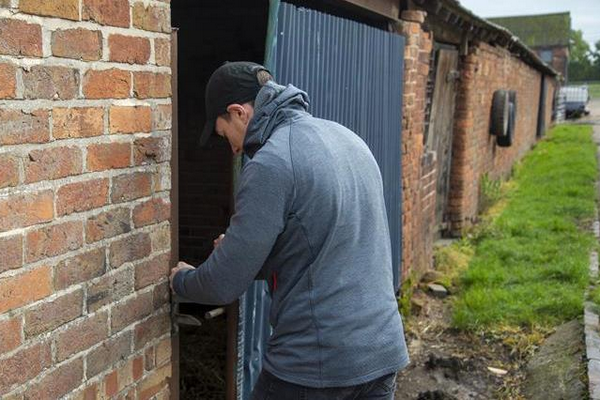NFU's team has put together practical advice on how to prevent thieves from targeting your farm, as well as steps to take when an incidence of theft occurs.
Machinery theft
Steps you can take to prevent machinery theft from happening on your land:
- Where possible, vehicles should be housed in a lockable garage or building, ideally with security lighting installed at the perimeter.
- Vehicles should always be locked when not in use, with the keys kept hidden and locked away in a secure location.
- Keep recordings or photographs of serial numbers and vehicles as these can be crucial in recovery, should the worst happen.
Steps you can take to prevent theft of quads and all-terrain vehicles:
- Invest in a bespoke quad security device, such as Quadvice, or a quality padlock and chain, such as those approved by Secured By Design – a police-approved product scheme.
- Securing to a fixed point on the ground or something that takes time to remove will also act as a deterrent.
- Never leave your keys in the ignition, even if you only briefly leave your ATV unattended.
- Keep gates to yards closed as open gates can be an open invitation to thieves.
Steps you can take to prevent the theft of tractors:
- Mark machinery with DNA marking devices and SmartWater tools.
- Sign up for CESAR, an agricultural equipment registration scheme, which increases the chance of recovering stolen goods by helping police identify stolen machinery
- Have the Vehicle Identification Number etched on the windows. This makes the vehicle more detectable and less appealing to thieves because they have to grind out the numbers.
- Install immobilizers, chip keys, and trackers as these are a simple way to deter criminals or track vehicles and can be fitted easily by an experienced agricultural engineer.

Fuel theft
Steps you can take to prevent fuel theft from happening on your land:
- Store fuel tanks within secure buildings or cages, keeping them locked and alarmed.
- Install an anti-siphon device on vehicles.
- Protect fuel tanks by equipping them with an alarm that will sound when fuel levels drop.
- Install CCTV that focuses on fuel tanks.
- Keep a regular inventory so you can identify missing fuel.
Livestock theft
Steps you can take to prevent livestock theft from happening on your land:
- Padlock all gates.
- Ensure stock is clearly marked and records are up to date.
- Graze livestock away from roads.
- Check stock regularly and at varying times.
- Consider a high-tech system such as TecTracer, which puts thousands of coded microdot markers into the fleece. The codes are virtually impossible to remove. Use signs to show that livestock are marked with the product.
- Ask neighbors to report unusual vehicles loading sheep.
- Gate or fence alarms.
What to do if you are a victim of livestock theft:
- Contact the police immediately (999 if a crime is in progress, 101 if it has already happened).
- Contact your insurers who will provide further advice. At NFU Mutual, farmers are covered for theft and mysterious disappearances. It must be reported to the police and a crime
- reference must be given
- Use social media. The more details you can share on social media, such as sheep breed, age, marking, and ear tag numbers, the better.
Who to call and when?
Urgent: If a crime is in progress dial 999. Non-urgent: Dial 101 to report a crime after it has taken place.
Provide information: Contact Crimestoppers to give information 100% anonymously. You can submit information online at CrimeStoppers.org or report via the helpline at: 0800 555 111
Source: NFU
